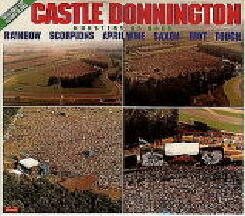With another album under their belts, Saxon is once again ready to exclaim “this town knows how to rock” on an extensive tour. The new album Call To Arms was released in North America on September 27 (released a bit earlier in Europe) and it is Saxon’s 19th studio album and as solid as most of them. The Digipak version also comes with a bonus disc — the band performing at Donington in 1980 — the original Monsters of Rock festival. (Note: a pretty decent live compilation album called Castle Donnington included the Saxon song “Backs To The Wall.” Unfortunately, only a CD version exists on a Japanese label but you can purchase used vinyl editions of this on eBay. Click here to see a sample).
Saxon is no stranger to producing great heavy metal music, they’ve been doing so since 1979 with the release of their self-titled, hard rockin’ debut. The lineup has changed several times since then, with some bumps along the way, but singer Biff Byford has led the band through all the highs and lows.
The following is an interview with Biff Byford shortly before the North American release of Call To Arms.
The song “Back in 79,” off the new album, struck me as feeling sentimental about Saxon’s beginning days.
Biff Byford: It is a bit of a sentimental one about the New Wave of British Heavy Metal, back in those days. A bit of a nostalgic song. A bit of a “Denim and Leather” revisited song, I think.
 It’s easy to look back at those days with fondness.
It’s easy to look back at those days with fondness.
Byford: I think everybody does, you know what I mean? Obviously, half our audience weren’t born but they can still look back and get themselves in that position, you know. It was a good point in history for music and metal. Just like the ’60s and the ’70s were big for Zeppelin and Sabbath. And then we sort of had our years in the ’80s, didn’t we?
What do you think about some of your contemporaries like Judas Priest announcing their retirement recently?
Byford: I don’t really believe it. (laughs) Maybe they might change their minds, I don’t know.
The Who and The Rolling Stones have said they were going to retire many times — and they are still going.
Byford: Oh yeah, there have been about fifty farewell tours. It’s fair enough, really. It’s a good excuse to play all their big hits anyway.
It’s hard for a lot of musicians to hang it up, I guess.
Byford: It’s the fan base as well. People don’t want them to retire. I think with Priest, the Nostradamus thing maybe affected them. It was a strange period for them, I think, that period. I think once they’ve done the (new) tour and settle down — and they got fresh blood in there now — it might change their minds. I don’t know. I’ll keep my fingers crossed.
How does a veteran band retain the same passion for music?
Byford: Well, obviously we’re not young lads anymore, but we still retain a certain naïveté in our approach to things. Everything is sort of exciting for us. Like our new album, when we were working on it. It’s quite exciting to try new things, you know. I mean, on this album the new thing is trying to make it a bit more old school, in the way of recording it more live, playing live. We were still using digital but the initial recording of it is very raw, if you know what I mean.
Yes. It is different than, say, Power and the Glory (1983) and albums like that, which were great but a bit more polished.
Byford: This album … I think it smacks you in the face when you put it on. That’s what you have to try and get, first track, first in. You have to get that kind of feeling, and this album gives you that kind of good feeling.
Is the title Call To Arms a message that’s calling on your fans …
Byford: Well, there are two messages. Of course, a call to arms to our fans and to rock fans in general, and there’s a sad song about soldiers being away from home writing letters to their loved ones. It’s a sad song but I suppose it’s a celebration as well, really.
It seems like it should be a call to arms for the fans to rally and support the band. Hard rock and metal need more support in America. Hard rock and metal records don’t sell as well as other genres in America.
Byford: Not as much, especially not in America. But sales are up in Europe. I think it’s mostly the packaging that we do. It’s always a great package with something free in it or something you can’t get by downloading. The fact that this album has a free mix of Donington 1980 festival — the best metal festival in the world. It’s a special album.
 The inclusion of Donington 1980 was a great extra. It captures the moment back then.
The inclusion of Donington 1980 was a great extra. It captures the moment back then.
Byford: It’s also good for young fans as well, to check it out, to see where all this British thing more or less started from — from the first major festival we ever played.
Well, for an older fan — you may love the new stuff but having Donington 1980 as an extra, you definitely want to buy it.
Byford: Well, it connects two eras, doesn’t it? It connects the ’80s with now. It’s just one of those things, really. We found it in somebody’s attic. A multitrack tape. We found eight tapes in an attic and we bought the tapes. A thousand dollars or something. And in the tapes was the Donington one. We were like ‘Whoah, here it is.’ One mutlitrack with seven songs on it.
Was it a fan or former band member that you bought it from?
Byford: It was an old manager, actually. … Don’t go there (laughs).
Well, it’s a very professional-sounding recording.
Byford: We had to have the tape baked. When you find an old tape, you have to have it baked. You cook it in an oven for 24 hours and it seals the oxide onto the tape. What they did is make a copy onto a DVD. Then you take that away and you can put that back on analog or do it on digital equipment, so that’s what we did.
How did you feel when first listening to it after all these years?
Byford: It’s great because I’ve heard bootlegs of it — there a quite a few bootleg versions out there — but when you hear this … obviously, it hadn’t been played since that day in 1980, so everything’s crystal clear. You can hear all the audience and everything. It’s just a piece of history, really. I thought it was a good idea to give it away with the Digipak version of this album.
It’s like finding treasure.
Byford: Definitely, yeah. We got a few things that we’ve found and kept. We’ve got an early show from Austin, and we have an early show from Oklahoma in the ’80s, when we first started touring America. They’ll all probably surface at some point in the future.
The artwork for the new album has a very retro feel.
Byford: It’s an original poster from the first World War, is what it is. It’s a promotional poster for recruiting people for the first World War. It used to say something like ‘England Wants You.’ We wanted it to look a little bit retro. The whole album has a little bit of a retro feel to it.
There was always something iconic looking about the first Saxon album covers.You knew right away it was a Saxon album.
Byford: Yeah, you knew right away, yeah. We’ve tried to go back to that a lot in recent years,
Looking back at all these albums … do you have a favorite?
Byford: I’m like most professional entertainers. I like the ones that sell the most (laughs). But I do have my favorites of the ones that sort of pass people by, if you know what I mean. For instance, I like the first album. It really didn’t get much airplay. There really wasn’t a big hit on there. I do like it because you can see a mixture of blues, prog rock, and heavy metal on that album. You can see where we experimented and got to a certain place. If you listen to it, it’s very ’70s but it’s also very modern as well. You can get it online and buy it on Amazon (to do so, click here). Basically, that and Power and the Glory are the two magical albums, with a magical feeling there.
For a short period of time in the ’80s, starting with the Innocence Is No Excuse album (1985) , the band started to get a little too polished and commercial.
Byford: I think the EMI days were great but for some reason we just lost the edge of it. That’s how it goes, really. We’re on EMI again now, so … (laughs).
One of the songs that many Saxon fans have always loved is “Dallas 1PM” (off of 1980s Strong Arm of the Law album). For a British band you really had a sense of American loss.
Byford: I think that sort of thing (the JFK assassination) was a loss for the world also, He was such a charismatic President. And he didn’t get shot by anybody outside the country, He got shot by an American … well, it depends on which conspiracy theory you go with, huh? But it was the first big assassination of the 20th Century.
Do you still get a lot of feedback from that song?
Byford: Yeah we do. It’s a massively popular song. A lot of American fans like that song. It gives meaning to people of that era.
Nothing seemed to capture heavy metal during the New Wave of British Heavy Metal than the song “Denim and Leather.” For many it was the first real metal anthem song, it seemed like it outdid Priest or any of the metal bands of that time.
Byford: I think up to that point we were one of the very first bands to really go there, writing about our fans. I think a lot of bands at that time wouldn’t even sign autographs. That’s what I wrote that song about and I think we often have that audience-band connection. The one thing that Metallica say, that they were influenced by that style of writing. It was a song for the audience, about the audience. It’s a simple song connecting us all together — connecting it all together was denim and leather and the music. I think musical snobs don’t like that song. I think that people who are into that style of music, get it. If you analyze it too much .. it doesn’t need that sort of thing. It’s a basic rock song about fans, really.
Well, when I was growing up at that time, heavy metal made me feel like I was a part of a club.
Byford: Yeah, you got it then. You just got it straight away. In the early days we were writing songs for college school kids and that’s where our fans were in the early days. And to some extent still are in Europe. There’s a massive resurgence of ’80s music here. And obviously it’s starting in America as well.
Europe always had a strong hard rock/heavy metal following.
Byford: It’s such a small place though, isn’t it? In England you can get there on a train in 30 minutes. The United States is huge. If you’re lucky enough to get on the playlist in America, your albums can be massive. But if you are doing it just by touring, it’s very hard. I mean this is the reason why we will be touring in America now, is because the album is being released. We haven’t had a proper release and tour in America in a long time, so… that sort of combination works.
Saxon has always embraced being a heavy metal band — even before it was a well-known term.
Byford: Well, when you write a song called “Heavy Metal Thunder” you really can’t get away from it. It’s a bit of a dead giveaway (laughs). But, yeah, we always loved fast and hard songs. It’s the way you play it. It’s not really what the song’s about. It’s the way you play it and the way people listen to it as well. One man’s metal is another man’s ballad. Some people listen to Journey and think it’s heavy metal, you know. And fair enough if that’s what you think. That’s how it is really. It just depends how people listen to it.
You just have to stick to what you do best, really. And don’t compromise. If you try to follow the fashion it’s not good.
That never worked for a lot of metal bands.
Byford: A couple of them. We couldn’t possibly think of doing a Country and Western style song but some bands can do it can’t they?
That would be interesting. Saxon doing a Country and Western song.
Byford: (laughs) Yeah, we’re not going there.
What do you think of ex-Saxon members Graham Oliver and Steve Dawson releasing a book called ‘Saxon Drugs and Rock and Roll – The Real Spinal Tap’ (Tomahawk Press, due Feb. 2012)? They are claiming to be “inspirations for the film This is Spinal Tap.“
Byford: Oh, I don’t know what they’re doing. I think they’re having a book. I mean, I wrote a book (Saxon – Never Surrender Or Nearly Good Looking: An Autobiography By Biff Byford And John Tucker) so maybe they are doing a book, to compete with my book. I don’t know what they’re doing.
But comparing Saxon to Spinal Tap?
Byford: Well, I think it’s a bit sad, isn’t it, really?
I had never seen Saxon as a Spinal Tap-type band.
Byford: Me neither. I don’t think anybody else does either. I just think they’re trying to ruin the name of Saxon for some reason. I just really don’t understand where they are coming from, actually.
Have all the lineup changes over the years negatively affected the band?
Byford: No I don’t think so. When a band member leaves it’s always a sad moment. It’s the chemistry of the band. isn’t it, that makes it all happen? And some combinations of this band have had a fantastic chemistry — and this one at the moment has a great chemistry for writing and playing live. It’s as good as the first one, really. And we’re all mates so it works out really good.
As a veteran do you get tired of life on the road?
Byford: The live side of traveling and everything can be a pain in the neck. But the concerts are great, you know. We have great crowds. We’ve just been to Japan for two shows — a far way to go for two shows. But the shows were fantastic.
Interview by Pat Prince











